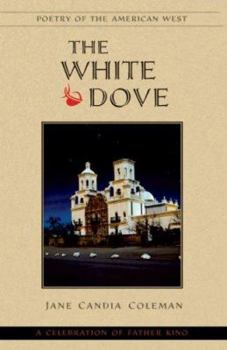The White Dove: A Celebration of Father Kino
Poems celebrating the legacy of early southwest explorer, Jesuit missionary, horseman, philosopher Father Kino by award-winning author Jane Candia Coleman. This description may be from another edition of this product.
Format:Paperback
Language:English
ISBN:0931271835
ISBN13:9780931271830
Release Date:September 2007
Publisher:High Plains Press
Length:92 Pages
Weight:0.85 lbs.
Dimensions:0.3" x 6.3" x 9.0"
Related Subjects
PoetryCustomer Reviews
3 ratings
A mark of dedication to one's religion
Published by Thriftbooks.com User , 16 years ago
To travel thousands of miles during a time where such a task was not a small flight like it is today, is a mark of dedication to one's religion. "The White Dove" is one poet's celebration of this man's acts over three hundred years ago. Father Kino was an early missionary in the American West before it was the American West, and Jane Candia Coleman describes his life and times in this brilliant anthology of poetry. "The White Dove" is a must for those with an appreciation for history, Christianity, and poetry. "The Mirage": Enter this web of canyons/at your own risk./Wander the labyrinth/of vanished rivers/crumbing faults,//and somewhere you/will meet yourself/pared to the bone,/as the bones underfoot/will testify.//These painted hills/thrusting out of earth,/these barren trails/do not lie except/ with permission.
this book is an important addtion to Southwest literature
Published by Thriftbooks.com User , 16 years ago
A beautifully crafted book of often visionary poems structured along the life of Father Kino, who was and is so important to the American Southwest. Like the Italian-American artist DeGrazia who also lived in Tucson, Jane Candia Coleman, Italian-American poet and novelist, invokes the life of the priest from Italy whose work in the Southwest was to have a lasting influence. Beautifully researched -- Coleman brings both the thoroughness of a scholar and the extraordinary sensitivity of a poet to her depiction of the life of a fascinating man of God. This book is as much about Kino's ecstatic response to Nature as it is about the mystery of the Spirit, so that even the unorthodox and mostly unrepenant sinners like myself will be moved by it. Someone please translate this book into Italian, and also Spanish! Also get this book into the classrooms! Victoria Tester, author of Miracles of Sainted Earth (University of New Mexico Press)
Father Kino Hoped to Go to China!
Published by Thriftbooks.com User , 17 years ago
In a time when early Christian mission work in the United States is often interpreted as empire-building at the expense of the indigenous people, how is it possible to admire a Jesuit figure like Father Kino, though he might be a builder of beautiful churches and originator of excellent agricultural practices as well as the breeding of fine animals like the famous "Barb" horses? Where do we find sympathy with a theologically conservative celibate loyal to his Pope? For Jane Candia Coleman in her poetry epic celebrating his life, after studying his papers for a decade, sees the answer in the land. Her insight is that Father Kino -- whose name means "China" -- really wanted to take the same path as Teilhard de Chardin took later to the broad lands of China but literally drew the short straw. Another monk went to Asia and Father Kino was assigned to the American Southwest. His reward was finding that what he thought would be in China was also present in the southwest: the land as access to God. Coleman's poems, meditative and full of praise, capture the experience of worship in psalm-like moments of insight. Often her reference is to de Chardin, another Jesuit who lived a century later. For instance, for her poem "Therefore I Am," the epigram is a de Chardin quote: "If I should lose all faith in God, I think I should continue to invincibly believe in the world." Then the poem: Why, here also is music! The rest between notes, the interminable breath between sound and sound. Is not silence as much a language as any other and filled with possibility? As when God enthroned in thunderous silence looked upon a void and knew these stones still warm beneath my hand though it be night. Father Kino was known for two main things: his warmth and kindness in persuading the Indians of northern Mexico and the SW United States to come to the church and the Mission ways of living, and his great interest in cartography which led both to road-building that connected remote villages and to sea routes, including an understanding of Baja California as a peninsula instead of an island. One might more accurately locate him as a father of de Chardin than the other way around, but both were great lovers and appreciators of the land, creation as access to the Creator. Kino got into trouble with the authorities when he opposed the use of forced Indian labor to mine silver for Spain and he lost colleagues in uprisings. His was a life of risk and effort, but that is not the emphasis of this book. By supplying Father Kino with vivid poetic epiphanies of relationship that illustrate ideas about spirituality, Coleman makes him real and convincing to modern people, whatever their ethnicity or politics. Coleman's cover and title, "The White Dove," comes from the familiar name of the Mission San Xavier del Bac near Tucson. A gorgeous moonlight portrait by Helga Teiwes of the present building is on the cover. Made of local earth, given a voice by a Spanish bell, it makes an ex





